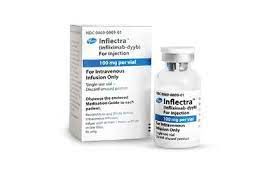- Bone Health
- Immunology
- Hematology
- Respiratory
- Dermatology
- Diabetes
- Gastroenterology
- Neurology
- Oncology
- Ophthalmology
- Rare Disease
- Rheumatology
Infliximab Study Yields Evidence of Biosimilar Equivalence
Adjusting for variables, investigators found little difference in disease outcomes for patients who switched to the infliximab originator vs biosimilars.
In a study of infliximab originator vs biosimilar use, the choice of regimens was not significantly associated with treatment success at the 6-month cutoff after initiation, investigators said in findings presented at Virtual ISPOR 2021.
Patients (N = 2806) with rheumatoid arthritis who initiated or switched to infliximab originator (Remicade) or biosimilars (Inflectra, Renflexis) since December 2016 were included in the retrospective analysis. Data were retrieved from the American Rheumatology Network–Trio Health Rheumatology registry.
Investigators said 70% received originator product; 69%, Inflectra; and 31%, Renflexis. They said there were differences in demographic and baseline clinical characteristics between the reference product and biosimilar patients that were significant factors in treatment success, based on multivariable analysis.
According to the study findings, the reference product was used earlier in the treatment process than biosimilars, and a higher proportion of reference product patients were likely to be in remission or with low disease activity when treatment began (66% vs 43% for Inflectra and 43% for Renflexis) or at the 6-month cutoff (75% vs 60% for Inflectra and 56% for Renflexis).
Remicade patients had fewer prior synthetic disease-modifying antirheumatic drugs or biologic regimens (mean regimens, 1.4 vs 2.2 and 2 for Inflectra and Renflexis, respectively; P < .001).
Patients on the originator product were less likely to be covered by Medicaid (4% vs 8% for Inflectra and 24% for Renflexis). The originator product cohort also demonstrated a smaller improvement in clinical disease activity score by the 6-month point (–1.6 vs –4.9 for both Inflectra and Renflexis).
Variables that significantly affected outcomes were baseline disease activity, payer types, and use of glucocorticoids, but not the choice of a biologic drug. “Patients with high or moderate baseline disease activity on Medicaid as opposed to commercial insurance and those receiving glucocorticoids were less likely to achieve remission or low disease activity at 6 months post regiment initiation,” investigators said.
Reference
Helfgott S, Radtchenko J, Soloman N, et al. Outcomes with infliximab and its biosimilars in patients with rheumatoid arthritis: real-world experience in the US. Presented at: Virtual ISPOR 2021; May 17-20, 2021. Accessed May 21, 2021. https://www.ispor.org/conferences-education/conferences/past-conferences/ispor-2021
Newsletter
Where clinical, regulatory, and economic perspectives converge—sign up for Center for Biosimilars® emails to get expert insights on emerging treatment paradigms, biosimilar policy, and real-world outcomes that shape patient care.

